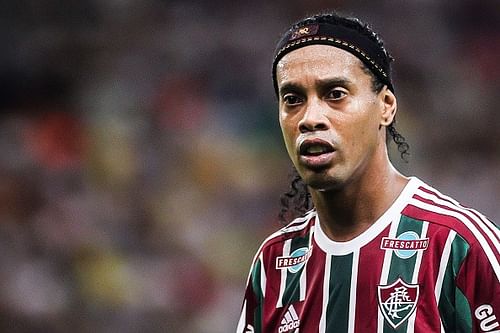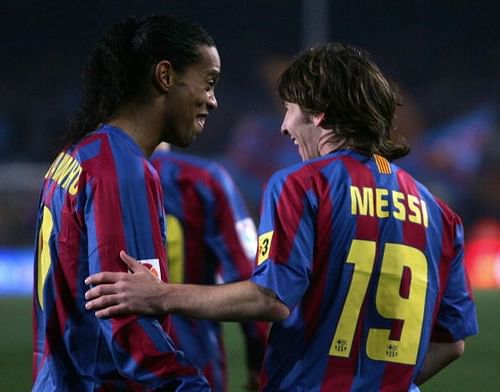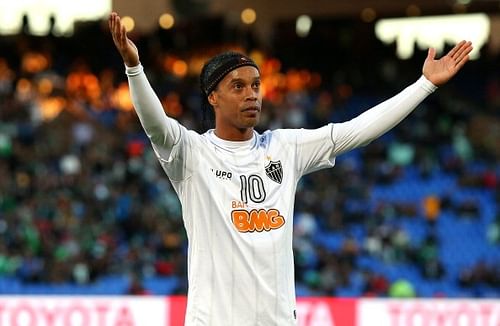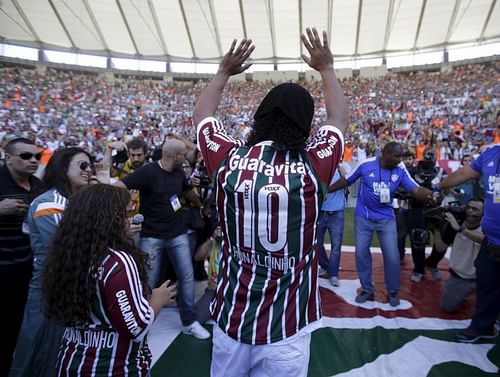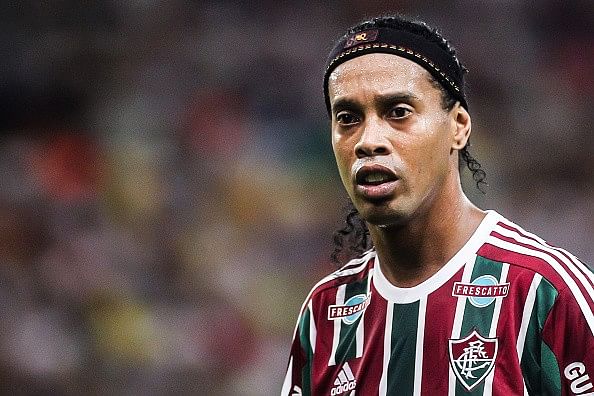
Tracing Ronaldinho's decline after Barcelona: The fall of a modern superstar
Brazilian footballers are such interesting creatures. They often possess the ability to astound and dazzle us with their artistry and innovation on the pitch, then fall away into obscurity. It is a perplexing recurrence in the discussion of great Brazilians, that they struggle – seemingly – more than other nationalities to find longevity in the beautiful game.
No footballer fits that bill more than Ronaldinho, the fading superstar who managed to thrill and enthrall football fans around the world before dwindling away from the twilight, like a sporting supernova. After such displays of supremacy with Barcelona, it seems ludicrous to read headlines of Ronaldinho considering offers from Malaysia and Switzerland.
From supercharging the wildly exciting Blaugrana outfit under Frank Rijkaard, the 2005 Ballon d’Or winner must now be considered something of a flickering genius when pitted against players like Ryan Giggs and even his Brazilian compatriot Cafu, who managed to exercise tremendous self-discipline so they could continue to operate at the highest level.
The decline of a Ballon d’Or winner
His decline has been lamentable, but irreversible. The dramatic fall from grace also forces one to look beyond the elasticos and the mesmeric dribbles, the smiles and the trophies. It is a process that reveals an extraordinarily blessed individual who failed to fully appreciate his gifts. His notorious, fast-living lifestyle is a telling factor in a player who eventually looked desperately out of depth among the very type of player he was once, ghosting past opponents with apparent effortlessness.
Looking at the second half of his career is startling. Ronaldinho has turned out for five teams in a little under seven years and four in the last four. The autumn stages of his career have been spent gallivanting across his native Brazil, with a fruitless pit-stop at Queretaro FC in Mexico. He has continued to score goals and occasionally charm the fans, but a player of such astounding natural talents should still be electrifying the Champions League.
After Brazil’s crushing semi-final defeat to arch-rivals Argentina at the 2008 Olympics, El Pais wrote that “the Brazilian is a false player, more given to pulling faces, cheerful chatter and other similar gestures”. One can’t help but read that as a not-so-thinly-veiled jab at a wilting Ronaldinho, who was comfortably outshone that night in Beijing by a burgeoning superstar for Argentina by the name of Lionel Messi.
Why Ronaldinho failed after his spell at the Camp Nou
It was Ronaldinho’s lack of application and dedication that prompted his nosedive from the high table of world football. In a troubled final season with Barcelona, Ronaldinho became something of a tabloid favourite because of his partying lifestyle and half-hearted approach to training which left many inside the Camp Nou lamenting that his best years were past him.
Lamentable, too, that he departed without ever really forming a devastating partnership with the man who would replace him as the magician in Catalan; Messi. Ronaldinho has alluded to a regret that he did not play enough with Messi but, with a worsening physical condition and diminished appetite for the game, the Brazilian was only ever going to exit stage left as Messi continued his unstoppable rise to the summit.
His three years at the San Siro, where he donned the famous red and black of the Rossoneri, where punctuated with a remaining propensity to fall into old habits. When news broke that Ronaldinho would be leaving Italy to return home to Brazil, fans were disappointed – but not at all surprised.
Massimiliano Allegri, the AC Milan coach at the time, said he was heading back to Brazil because of a “life choice”. Unmoved, too, was Carlo Ancelotti, the man who had signed Ronaldinho and essentially provided a second chance following his departure from Barcelona.
“The decline of Ronaldinho hasn't surprised me. His physical condition has always been very precarious. His talent though has never been in question.” – Carlo Ancelotti
Ancelotti’s remarks are trenchant – Ronaldinho’s physical capabilities have always been the source of reservation for those who saw him play the most. Many Premier League followers often wax lyrical about how the Brazilian would have exhilarated English football, specifically when Manchester City courted him before his exit from Milan.
However, considering his consistent lack of dedication to maintaining a perfection of his craft, it is difficult to think that he would have been anything other than a miserable failure among the unforgiving and unrelenting physical demands of the English game.
As it were, he returned to Brazil after signing a three-year contract with Flamengo. 20,000 fans flocked to the Maracana in a presentation which surpassed even the homecoming of Zico, more than 20 years earlier. “Many come back to Brazil only to close out their careers,” Ronaldinho told reporters as he waved to excited bands of supporters.
He insisted that, at 30, he felt he could thrust himself back into the national team reckoning and help them towards a sixth World Cup. However, Ronaldinho managed only a handful of international appearances after stating such an objective and his homecoming was soon to be tarnished by an acrimonious departure when he left after cancelling his contract.
Mini resurgence with Atletico Mineiro
Just four days later, he could be seen resurfacing at Atletico Mineiro, which is perhaps the anomaly in Ronaldinho’s decline. It was there, in Belo Horizonte, that Ronaldinho recaptured some of the sparkling form that had propelled him to being hailed as the most exciting footballer of his generation.
Indeed, Ronaldinho won the Brazilian Golden Ball for his skill-laden performances in 2012 and even helped the club to a historic season in 2013, where they won the Campeonato Mineiro and Copa Libertadores – the first-ever in the club’s history. Ronaldinho looked refreshed and buoyant during Atletico’s dramatic surge to Libertadores glory when he contributed four goals and seven assists.
He was subsequently named the 2013 South American Footballer of the Year. Sound like a player in decline? Not exactly, but his fleeting renaissance was to soon descend once again into a fruitless endeavour into Mexican football, before returning once again to Brazil with Fluminense.
Have we seen the last of Ronaldinho?
When Ronaldinho’s contract was terminated, Fluminense sporting director Mario Bittencourt stated: “Ronaldinho asked us for a meeting. He respectfully told us he didn't feel he was able to perform as good as he wanted and that it was a bad situation for him. He made a great gesture in saying he wasn't being the player he felt he could be right now.
“I'll never speak about whether or not he is retiring. That's not something you say about a player of his calibre. He was always spectacular, as player and person.”
It was a remarkable statement in that it revealed Ronaldinho’s realisation that he represented a mere shadow of the dancing winger who delighted and created a portfolio of tricks that gave us those enchanting YouTube compilations.
It is sad to see that he joins the list of excellent but ultimately frustrating Brazilians who frittered away the second halves of their career, like Robinho or Adriano. Ronaldinho achieved a greater deal than his two aforementioned counterparts, but his decline is a sorry example of how a lack of appreciation for what he had while he had it ultimately accelerated a downfall that has pushed him into the periphery of world football.
So long, Ronaldinho. It was fun while it lasted.
